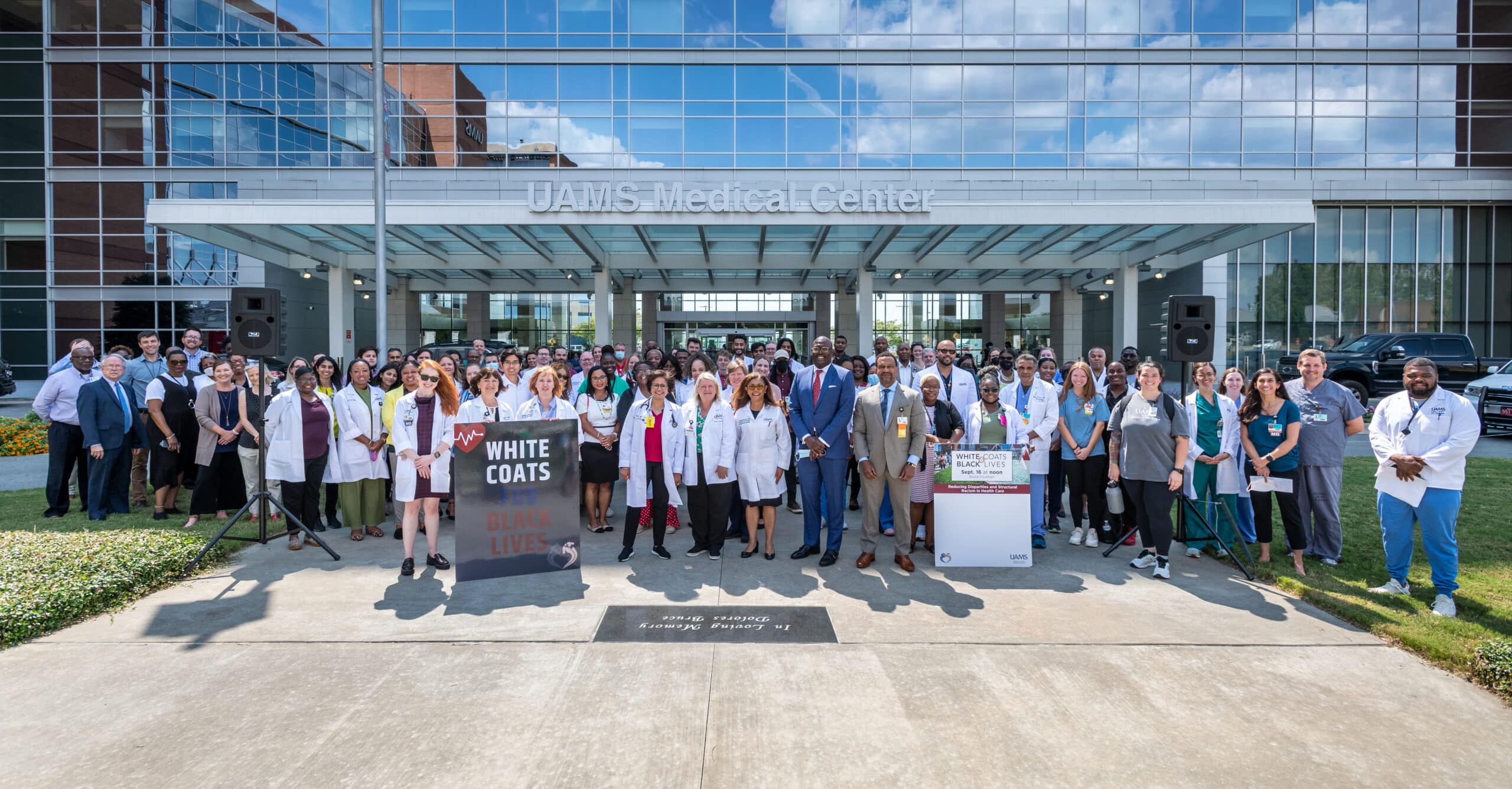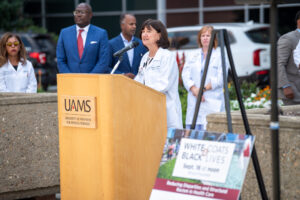UAMS Speaks Out Against Racial Inequities in Health Care

[ad_1]
View Larger Image

Participants stand together after the White Coats for Black Lives event at the University of Arkansas for Medical Sciences.
Image by Bryan Clifton
| Students and employees gathered in front of UAMS Medical Center to oppose disparities and structural racism in health care that adversely affect Black communities and to hear about efforts by the University of Arkansas for Medical Sciences (UAMS) to provide equitable care for everyone.
The White Coats for Black Lives event was first held in 2020. Brian Gittens, Ed.D., noted that at the time of the inaugural gathering, the nation was grappling with high-profile killings of several Black men and women, and people from every corner of the country were protesting for social justice.
“It’s been two years, and there still remains a need for us to gather and talk about this important issue,” said Gittens, vice chancellor of the UAMS Division for Diversity, Equity and Inclusion (DDEI). “The global pandemic continues to provide examples of the lack of access to quality health care and of the structural racism experienced by many Black Americans who seek medical attention.”
Gloria Richard-Davis, M.D., MBA, executive director of DDEI, said the pandemic also highlighted that medical conditions such as hypertension, obesity and diabetes disproportionately affect Black Americans.
“This means that when COVID-19 hits them, it hits them harder,” she said. “COVID attacked a point of vulnerability in our society and placed all of us at risk. We are one community, and we must remember that health disparities continue to ravage our Black communities.”
Richard-Davis said historical experience has caused many Black Americans to mistrust the health care system, and it’s vital that medical providers work to gain that trust while pursuing equity for all.
“Let us not lose the lessons learned from COVID and all that 2020 has taught us,” she said. “May we all stand up and do better. We stand against racism. We must advocate for equity for all.”
Michelle Krause, M.D., MPH, interim CEO of the UAMS Medical Center and interim senior vice chancellor for UAMS Health, said many of UAMS’ key institutional and strategic initiatives focus on improving health outcomes for Black Arkansans, particularly where disparities exist.
One area of focus is on reducing maternal and infant mortality. Black women account for about 20% of births but are nearly twice as likely to die during childbirth or in the following year, Krause said. UAMS and its partners are taking steps to reduce the risk for these women, emphasizing the prevention and treatment of severe bleeding after childbirth, educating women on signs and symptoms of preeclampsia, and highlighting the importance of prenatal care.
Stephanie Gardner, Pharm.D., Ed.D., UAMS provost and chief strategy officer, cited a 2020 declaration by the Association of American Medical Colleges that racism is antithetical to the oaths and responsibilities accepted by health professionals.

Stephanie Gardner, provost and chief strategy officer, talks about UAMS’ commitment to reducing inequities in health care.Image by Bryan Clifton
“As the state’s only health sciences university, we bear a responsibility to those we serve to acknowledge and speak out against racism, discrimination and bias,” she said.
UAMS’ strategic plan includes goals for enrollment reflecting the diversity of the state. Gardner said UAMS is committed to being an employer of choice for a diverse workforce, and it is engaging its academic, clinical and research enterprises to reduce disparities and break down barriers to health care in communities of color.
Rawle A. “Tony” Seupaul, M.D., chair of emergency medicine and vice dean for clinical affairs in the College of Medicine, said the state has immense disparities in health outcomes that hurt Arkansans in rural areas and those from underserved populations. “Access to health care shouldn’t depend on where you live or whether you fall into any of these groups,” he said.
Quincy Gragg, president of the Edith Irby Jones chapter of the Student National Medical Association, praised UAMS for providing the resources to connect minority students and make them feel comfortable, but he urged the university not to become complacent.
“Instead, I want UAMS to stay at the forefront of progressive thinking and to truly earn the claim of diversity being its superpower in both the hospital and the academic setting,” said Gragg, who is in his second year in the College of Medicine.
Little Rock Mayor Frank Scott Jr. said the pandemic revealed health care and financial disparities, but it also showed that Black lives matter. “We understand that during this time, in our city and our nation, that there are injustices,” he said. “And every industry, every community has a role to play to ensure that representation matters.
“I’m so grateful for the diversity, equity and inclusion efforts of UAMS, for you all truly leaning in where it matters,” Scott said.
Co-chairs of the committee that organized the event were Rebekah Thacker, MNSc., director of nursing research, excellence and magnet programs at UAMS; and Edward Williams, DMSc., M.Ed., chair of the Department of Physician Assistant Studies and assistant professor in the College of Health Professions.
[ad_2]
Source link

